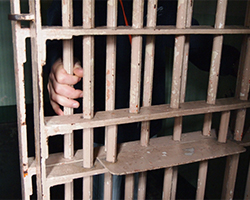People in prisons should not be left behind amid COVID-19 vaccination

WHO
People living and working in prisons should not be neglected as national programmes of COVID-19 vaccination roll out across the WHO European Region and globally. That is the main message of a recent article published by WHO/Europe in the Lancet journal.
During the pandemic, immunization activities in detention facilities can play a big role in reducing inequities in countries.
Vaccination for prisoners: the WHO European Region can do better
WHO research shows that the risk of transmission of COVID-19 is higher in prisons, where people live in close proximity to each other and have limited access to testing and personal protective equipment. Compared to the wider community, people living in prisons have a disproportionally higher burden of comorbidities, including noncommunicable diseases (NCDs), which increases their chances of suffering severe outcomes from COVID-19.
On World Health Day 2021, held on 7 April, WHO called on leaders to address health inequities and ensure that everyone has access to quality health services, when and where they need them. This issue is especially relevant for detention facilities.
As COVID-19 vaccines become available, the inclusion of people living and working in prisons in national immunization programmes is not being universally adopted.
“Even though good practice exists in many countries of the WHO European Region, the diversity of criteria adopted between and within countries puts equality of health protection at risk. It is essential to understand that loss of freedom should not lead to loss of health,” said Dr Nino Berdzuli, Director of the Division of Country Health Programmes at WHO/Europe.
Health risks in prisons: higher cancer prevalence
“Imprisonment is known to disproportionally affect people coming from marginalized and low-income social groups. Many of these individuals have their first contact with health care only following incarceration,” said Dr Carina Ferreira-Borges, ad interim Head of the WHO European Office for Prevention and Control of Noncommunicable Diseases (NCD Office) and Programme Manager, Alcohol, Illicit Drugs and Prison Health – one of the authors of the Lancet publication.
The WHO/Europe article for the Lancet highlights the need to ensure that all detention facilities have sufficient capability and resources to provide universal access to quality health care. One example of this inequity is access to cancer screening, which inevitably affects incidence and prevalence. It has been suggested that the prevalence of human papillomavirus and invasive cervical cancer is higher in prison compared to the general population, resulting from disproportionate exposure to risk factors such as multiple sexual partners, but also from poor access to health preventive services, including access to national screening programmes and vaccination.
People in prison have a substantial excess mortality from a range of causes, only partly explained by deprivation of health care, especially deaths caused by drug overdose. Detained individuals aged over 50 experience a higher burden of NCDs than age-matched community peers.
In short, the underlying health problems of the detained population, combined with inferior health services, increase the risk of serious illness or death.
“COVID-19 makes no distinction of place, race or culture. Vaccination is the bulwark against the pandemic in prisons, just as anywhere else. To take care of a person in prison is to take care of humanity,” said Fadi Jean Meroueh, the Head of the health unit of the Villeneuve-lès-Maguelone prison, in Montpellier, France, who is also the President of Health Without Barriers, the European Federation for Prison Health, which represents prison health professionals.
“People living in prisons should be included in national COVID-19 vaccination plans on the basis of their increased vulnerability, the principle of equivalence, and the duty of governments to protect those deprived of their liberty, leaving no one behind,” concluded Dr Ferreira-Borges.
European Programme of Work
Ensuring more people benefit from universal health coverage and better health and well-being are central to the European Programme of Work 2020–2025 – “United Action for Better Health in Europe”. This includes ensuring inequities in health are addressed, so no one is left behind, regardless of their circumstances.



